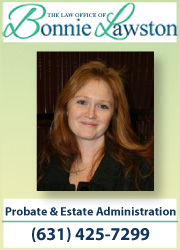PROTECTING YOUR RIGHTS IN AN ESTATE WHEN YOU LIVE ELSEWHERE
We live in a mobile society, where our children can and often do grow up and move to another state or even another country. Because of that increased mobility, it’s a fairly common occurrence that beneficiaries and fiduciaries of a New York Estate (will) or Administration (no will) or Kinship will reside outside of the Empire State. It’s also not uncommon for the person named as executor/administrator or for a beneficiary of the New York estate to live in another state or another country.
 At the Law Office of Bonnie Lawston, P.C., we have extensive experience working with non-residents of New York who have an interest in or are involved in any way with a New York estate, probate, administration (intestacy – no will) or kinship(no will) proceeding. To learn how we can help you take the right steps to successfully address all necessary legal matters, maximize your estate and inheritance, and settle a New York estate, call us at 631-425-7299 or contact us by e-mail to set up a free initial consultation.
At the Law Office of Bonnie Lawston, P.C., we have extensive experience working with non-residents of New York who have an interest in or are involved in any way with a New York estate, probate, administration (intestacy – no will) or kinship(no will) proceeding. To learn how we can help you take the right steps to successfully address all necessary legal matters, maximize your estate and inheritance, and settle a New York estate, call us at 631-425-7299 or contact us by e-mail to set up a free initial consultation.
CAN A NON-RESIDENT OF NEW YORK SERVE AS EXECUTOR OR ADMINISTRATOR OF A NEW YORK ESTATE?
New York law does not prevent a US Citizen who resides in another state or even another in another country from assuming the duties of personal representative or executor of a New York probate or administration proceeding. Under §707 of the Surrogate’s Court Procedure Act (SCPA), any person who is not a “non-domiciliary alien” qualifies to act as a fiduciary in the probate of an estate. In essence, that means that an American citizen living anywhere on the planet is eligible to be executor of a New York estate. That provision is applicable whether the deceased dies with a valid and enforceable will or dies intestate. Under certain circumstances and with other safeguards in place, one who is not a citizen can serve as well.
WHAT ARE THE ISSUES THAT AFFECT OUT-OF-STATE PARTIES IN ESTATE PROCEEDINGS?
When a New York resident dies with potential estate beneficiaries living in other states or countries, a number of critical issues can arise:
- It can be difficult to determine who all the potential beneficiaries are and where they can be found. This is generally resolved by preparing a Due Diligence Affidavit, a report that includes all the documents and searches conducted to show the family relations. Objections and other formal pleadings must be filed in a timely manner meeting all deadlines and the party seeking to establish kinship must document exactly how they are related to the deceased. In particular, where the next-of-kin are cousins of the deceased, legal documents and testimony must be filed for them to establish their family tree to claim a share of the estate.
- There may be disputes regarding distribution of assets under the will—Though will contests are not the norm, they do happen and can be complex and time-consuming. If you are involved in any type of will
- Read More
Contact the Law Office of Bonnie Lawston, P.C.
At the Law Office of Bonnie Lawston, P.C., we focus our practice exclusively on probate estates(matters with a will), administration estates (intestacy or no will matters), ancillary estate and administration and kinship matters, with a majority of cases in Nassau County and Suffolk County on Long Island. We have represented many out-of-state parties in primary and ancillary probate and administration proceedings, as well as kinship matters protecting the rights of heirs to maximize their inheritance. Contact our office online or call us at 631-425-7299 to set up a free initial consultation.
